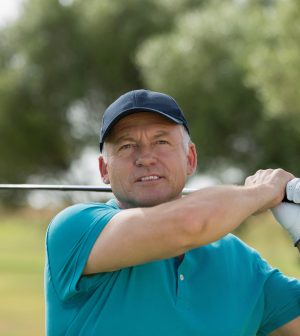- Could Your Grocery Store Meat Be Causing Recurring UTIs?
- Are You Making This Expensive Thermostat Error This Winter?
- Recognizing the Signs of Hypothyroidism
- 10 Strategies to Overcome Insomnia
- Could Artificial Sweeteners Be Aging the Brain Faster?
- Techniques for Soothing Your Nervous System
- Does the Water in Your House Smell Funny? Here’s Why
- Can a Daily Dose of Apple Cider Vinegar Actually Aid Weight Loss?
- 6 Health Beverages That Can Actually Spike Your Blood Sugar
- Treatment Options for Social Anxiety Disorder
Have Arthritis? Take a Swing at Golf for Better Health

Could golfing be good medicine for arthritis?
Yes, according to researchers who found that for people with osteoarthritis, golfing lowered psychological distress and improved general health when compared with the general population.
“Golf is a health-enhancing source of physical activity, particularly for older adults,” said lead researcher Brad Stenner, an occupational therapist at the Alliance for Research in Exercise, Nutrition and Activity at the University of South Australia, in Adelaide. “Golf is fun, affordable and a sport for life, with clear physical and mental health benefits.”
For people with osteoarthritis (often called the “wear and tear” form of arthritis), golf helps maintain joint range of motion, strength and endurance, and contributes to mental health and well-being. Playing golf is also associated with lower levels of chronic diseases, such as diabetes, obesity and heart disease, Stenner said.
“We found that golfers both with and without osteoarthritis had higher quality of life and, significantly, lower levels of psychological distress, which is an indicator of anxiety and depression,” he noted. “Golf appears to help improve well-being via a number of factors, including exercise, community, friendship and a sense of belonging.”
Many people with arthritis stop playing sports altogether, but the impact of arthritis on playing golf is unknown, Stenner said.
“Our study looked at benefits for those with arthritis, not factors that may be barriers. It would appear from our findings at least, that those with osteoarthritis can continue to play golf given its relatively low impact on the joints, and enjoy the benefits of doing so,” he added.
For the study, Stenner and his colleagues surveyed 459 golfers with osteoarthritis. More than 90% of golfers rated their health as good, very good or excellent, compared with 64% of those in the general population who didn’t golf, the investigators found.
Moreover, among people with osteoarthritis, 22% of non-golfers reported high to very high levels of psychological distress, compared with just 8% of golfers.
The report was published recently in the Journal of Science and Medicine in Sport.
It may seem counterintuitive that physical activity can help reduce pain and improve the well-being of people suffering from osteoarthritis, but that’s exactly what doctors recommend, said Dr. Ariel Goldman, an orthopedic surgeon at Northwell Health in Great Neck, N.Y.
“Because osteoarthritis … is a degenerative disease of the cartilage in the joints, which provides gliding and shock absorption, you wouldn’t expect patients to have better reports of their pain if they’re more physically active,” he said.
“But actually patients with arthritis who play golf have lower reports of arthritic pain than those that don’t, and that goes along with other studies that show that more activity allows patients to deal with their osteoarthritis better,” Goldman explained.
Regular physical activity can help improve pain, quality of life and reduce risk factors such as obesity, he added.
Golf is a relatively low-impact sport and can play a role in maintaining mental health and overall well-being, especially if you walk the course and don’t use a golf cart, Goldman advised.
Other low-impact activities that may have the same benefits as golf include yoga, Pilates, tai chi, bowling, pickleball and just taking a walk, he said.
“This study, like many other studies, shows that low-impact physical activity helps the physical and emotional well-being of patients suffering from osteoarthritis,” Goldman said.
More information
The Arthritis Foundation has more on osteoarthritis.
SOURCES: Brad Stenner, PhD, lecturer and occupational therapist, Alliance for Research in Exercise, Nutrition and Activity, University of South Australia, Adelaide; Ariel Goldman, MD, orthopedic surgeon, Northwell Health, Great Neck, N.Y.; Journal of Science and Medicine in Sport, March 2023
Source: HealthDay
Copyright © 2026 HealthDay. All rights reserved.










